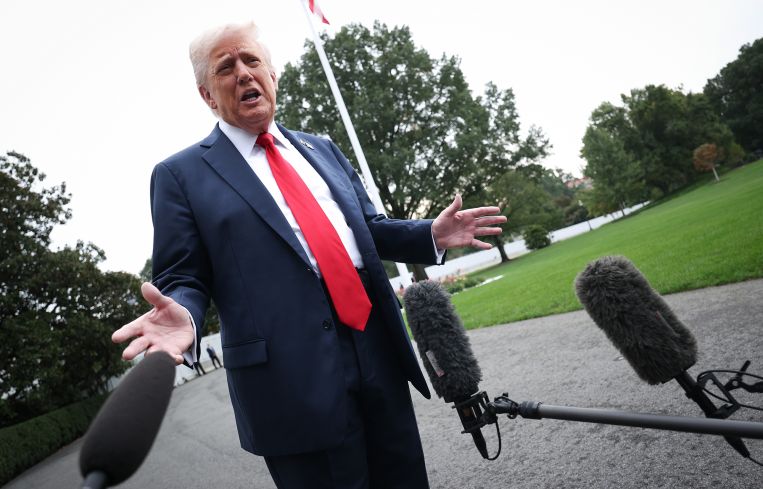Trump Administration Pulls $18B in Infrastructure Funds From New York State
Experts and industry leaders warn that cuts could hurt the national economy
By Mark Hallum October 1, 2025 5:04 pm
reprints
The federal government pulled $18 billion in federal Department of Transportation funding from New York State on Wednesday, in a move that could delay crucial New York infrastructure projects and also be felt far beyond the state.
The U.S. Department of Transportation (USDOT) targeted transit projects and transit-related counterterrorism efforts with the funding freeze, including a $300 million disbursement for the Second Avenue Subway, and funding for the Gateway Tunnel project, claiming that the process for awarding contracts by prioritizing Disadvantaged Business Enterprises (DBE) or Minority- and Women-Owned Business Enterprises (MWBE) was in itself discriminatory, and a violation of civil rights laws.
“Secretary Sean Duffy’s position on the DBE program is clear – subsidizing infrastructure contracts with taxpayer dollars based on discriminatory principles is unconstitutional, counter to civil rights laws, and a waste of taxpayer resources,” a USDOT statement said. “The department is focusing on these projects because they are arguably the largest infrastructure initiatives in the Western Hemisphere, and the American people want to see them completed quickly and efficiently.”
The implications of the federal government’s decision seemed counterintuitive to the reasons it gave, however.
“This is political payback and an attack on New York and its residents, and it puts every family across our state in harm’s way,” Gov. Kathy Hochul said in a statement. “Every New Yorker should be outraged. From the construction worker who could lose their job, to the commuter stuck on a delayed train, to the families who rely on brave law enforcement officers to keep them safe. I will not sit idly by while Donald Trump defunds public safety and lets our infrastructure crumble. We will use every tool available to us to restore this funding and ensure that these critical infrastructure projects get built and keep every New Yorker safe.”
The funding freeze stems from the federal government shutdown that began on Tuesday after Senate Democrats and Republicans failed to come to the table over health care subsidies that are expiring under the Affordable Care Act.
The economic impacts of the funding freeze are not only likely to hurt the city’s economy, but will also have national impacts as state tax revenue declines, according to Travis Terry, founder of Immortal Strategies, a consultancy for public-private partnerships.
“If you were CEO of the United States of America, if it was a business, you would want to invest in your profit centers and fix the ones that are underperforming,” Terry told Commercial Observer. “You would think that a smart businessperson would want to really lift that up, because the country makes a lot of money based on the success of New York. If you’re putting soldiers into the city, trying to harm some of its infrastructure, hurting social services or its ability to generate economic development, you’re only hurting the rest of the country.”
To the Metropolitan Transportation Authority, a state fiduciary, directives from the federal government used to justify the clawback were confusing at best, although the ultimate goal seemed pretty transparent.
“The federal government wants to immediately ‘review’ our compliance with rules they told us about moments ago,” MTA Chief of Policy and External Relations John McCarthy said in a statement. “We’re reviewing their tweets and press releases like everyone else. For now, it looks like they’re just inventing excuses to delay one of the most important infrastructure projects in America.”
Cornell University infrastructure policy expert Rick Geddes believes that while the Q train extension aspect of the Second Avenue Subway project between East 96th and East 125th streets may not grind to a halt, the price tag will rise substantially.
“Although work on the projects is likely to continue despite the withholding of these funds, a lengthy delay might slow them down. That would be unfortunate, since time is money in infrastructure delivery,” Geddes said in a statement. “Despite being a critical project of the economic health of the region, the Gateway Project has long suffered from political machinations. Parts of the Second Avenue Subway have been called the ‘world’s most expensive mile.’ Any stoppage of work would likely raise costs further.”
Thomas Prendergast, CEO of the Gateway Development Commission (GDC), which is overseeing the tunnel dig under the Hudson River, was keeping a cool head.
“GDC has received notification from FTA regarding a pause in disbursements for the Hudson tunnel project. GDC complies with all federal laws and regulations, and will continue to do so throughout the project. We look forward to continuing our productive relationship with the administration, FTA, FRA, and the U.S. Department of Transportation,” Prendergast said in a statement. “In the meantime, we remain focused on keeping the project on scope, schedule, and budget.”
Mark Hallum can be reached at mhallum@commercialobserver.com.



